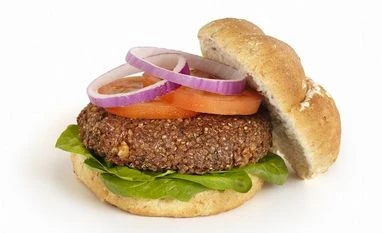The meatless-meat category is facing a renaissance, and legacy veggie burger brands are fighting to stay relevant in the frozen-food aisle.
Frozen bean and veggie-based patties dominated the market for meat alternatives for years. Now, Impossible Foods Inc. and Beyond Meat Inc. have grabbed the attention of vegans and meat-eaters alike by developing plant-based burgers that imitate beef, even using beet powder or other ingredients to make the patties “bleed.”
“It isn’t like this is a totally new space,” said Bob Nolan, senior vice president of demand sciences at Conagra Brands Inc. Veggie patties have been around for years, but they weren’t “of the quality that they are today.” he said.
Since Beyond Meat arrived on the scene in 2013, sales of meat substitutes among the nine largest producers have climbed 56 per cent, according to Euromonitor International. Yet with more upstarts entering the market, the share among companies is spread thinner every year. Kellogg Co’s MorningStar Farms brand has lost about half of its piece of the pie since 2013, even as its sales have grown, data from the research firm show.
A fresh focus on plant-based meat substitutes has encouraged alternative protein makers to change their recipes, upgrade packaging and invest in new plant-based initiatives. Some brands have extended their scope to meatless chicken, bacon and sausages to further differentiate in an increasingly crowded veggie burger aisle.
People used to view meat alternatives “as a compromise,” Nolan said. “These new guys showing up have brought new attention into it.”
Getting closer
Kraft Heinz Co-owned Boca went through a brand refresh in 2018 that included improving taste and texture to “get closer to the real thing,” said Lynne Galia, a company spokeswoman. The company also changed its packaging to clearly display protein contents.
MorningStar Farms has added meatless popcorn chicken to its portfolio to attract customers who are increasingly interested in snacking. The company has also pledged to be 100 per cent vegan by 2021, removing eggs from all of its products.
Conagra agreed to buy Pinnacle Foods in June 2018, giving it access to Gardein’s line of meatless chicken, burgers, fish and breakfast sausage. Last month, Conagra started selling a new spicy Gardein item that’s supposed to mimic chicken, and is made with wheat flour, canola oil and pea protein. The Chicago company also is working on new veggie meals under its Healthy Choice and Birds Eye brands.
Private label is looking to get into the plant-based craze, too. No frills grocer Aldi began selling a plant-foods line in January 2018 for a limited time under its new Earth Grown brand. Customer response was so overwhelming that Aldi decided to keep some of the products around — introducing them permanently nationwide last August.
That seven-month launch “was by far the fastest turnaround we’ve ever had,” said Scott Patton, vice president of corporate buying at Aldi. Earth Grown sales have tripled in the past 18 months.
Growth opportunities
Plant-based meat that mimics the real thing is one of today’s buzziest food trends, seeking to attract flexitarians who are trying to eat less meat. Barclays Plc has predicted that the plant-based food market will be worth as much as $140 billion in 10 years.
Companies that choose not to invest in developing better meat alternatives are going to miss out on both the opportunity side of growth and expose themselves to risks, said Aarti Ramachandran, head of research and engagements at sustainable development advocate FAIRR Initiative. With climate change in the picture, the costs to maintain animal supply chains will become more expensive, she said.
“Startups have really led this space in terms of innovation and now big food companies can bring the scale of their innovation and bandwidth prowess to this issue so the category can rally scale up and reach a broader audience,” she said.
Unlock 30+ premium stories daily hand-picked by our editors, across devices on browser and app.
Pick your 5 favourite companies, get a daily email with all news updates on them.
Full access to our intuitive epaper - clip, save, share articles from any device; newspaper archives from 2006.
Preferential invites to Business Standard events.
Curated newsletters on markets, personal finance, policy & politics, start-ups, technology, and more.
)